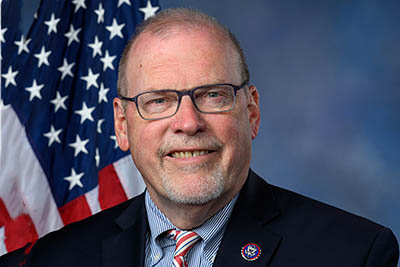Pro Forma
 At the end of July, I presided over a pro forma session of Congress in the U.S. House of Representatives.
At the end of July, I presided over a pro forma session of Congress in the U.S. House of Representatives.
When a pro forma session is called, it typically means there is no consideration of legislation or debate scheduled for the floor of a chamber. Almost every Member of Congress is serving their respective constituencies back in their districts.
Annual sessions of Congress begin in January, when the United States House of Representatives and the United States Senate convene.
We are currently in the second annual session of the 118th Congress, denoted as 118-2 by some.
The U.S. Constitution deems that neither chamber may adjourn for three days or more without consent of the other.
The Adjournments Clause of the Constitution reads, “Neither House, during the session of Congress, shall, without the Consent of the other, adjourn for more than three days.”
This applies to both the U.S. House of Representatives and U.S. Senate.
Pro forma sessions are meant to maintain compliance with this provision of the U.S. Constitution. Pro forma sessions prevent the occurrence of a “recess of the session.” In effect, the session for the year continues, whereas an adjournment would end the session.
My presiding over the pro forma session allowed the second session of the 118th Congress to continue without termination.
But pro forma sessions are valuable for other reasons as well.
Preventing recess or adjournments from taking place is rooted in the belief that the executive branch could “run wild” if Congress were not in session.
For instance, presidents retain the power to make recess appointments. Under the Recess Appointments Clause of the U.S. Constitution, the president may temporarily appoint somebody to a position if a vacancy occurs while the U.S. Senate is in recess. These positions can range from a new U.S. attorney for the Western District of Virginia to a Supreme Court justice.
This temporary appointment then expires at the end of the following session of the U.S. Senate, and the appointee would need to be confirmed by the U.S. Senate if they were to continue in their appointed role.
Alexander Hamilton, an ardent Federalist and believer in a strong executive, viewed the Recess Appointments Clause favorably so the president could fill vacancies without delay.
President Obama was found to have unconstitutionally recess appointed three individuals in National Labor Relations Board v. Canning.
In a unanimous ruling, the justices wrote that a pro forma session does not create a recess long enough to trigger the Recess Appointments Clause.
The opinion notes: “For purposes of the Recess Appointments Clause, the Senate is in session when it says it is, provided that, under its own rules, it retains the capacity to transact Senate business.”
Furthermore, the justices established that a recess has to constitute a period of time greater than ten days.
Presidents Lyndon B. Johnson and Richard Nixon issued executive orders while Congress adjourned. Nixon’s order established a Council on Environmental Equality and a citizens’ advisory committee to the council.
TIME magazine described the council as “a Cabinet-level advisory group designed to coordinate governmental action against environmental decay at all levels, create new proposals to control pollution, and foresee problems.”
The council served as a basis for establishing the Environmental Protection Agency (EPA).
State legislatures adjourn too.
As a former member of the Virginia House of Delegates, I am used to adjournments of greater than ten days.
The general assembly session is held for sixty days in even-numbered years, and generally forty-five days in odd-numbered years. For a big chunk of the year, the general assembly stands “sine die”, meaning adjourned.
In 2000, the Republicans passed a biennial budget for Virginia including two steps in the repeal of the state’s car tax, an issue that then-Governor Jim Gilmore supported.
Gilmore’s campaign slogan of “Axe the Tax” was popular when he ran for governor in 1997.
In 2001, I moved for the House of Delegates to adjourn sine die without Senate consent in order to preserve the second step in the biennial budget to take the car tax relief to 70%.
Because of that adjournment, today you pay roughly 20% less on the car tax.
That experience taught me that adjournments, while seemingly benign on surface, can be a powerful tool indeed.
Accordingly, I was glad to perform the functions of a pro forma session so the legislative branch could keep in check executive action.
If you have questions, concerns, or comments, feel free to contact my office. You can call my Abingdon office at 276-525-1405 or my Christiansburg office at 540-381-5671. To reach my office via email, please visit my website at www.morgangriffith.house.gov. Also on my website is the latest material from my office, including information on votes recently taken on the floor of the House of Representatives.









